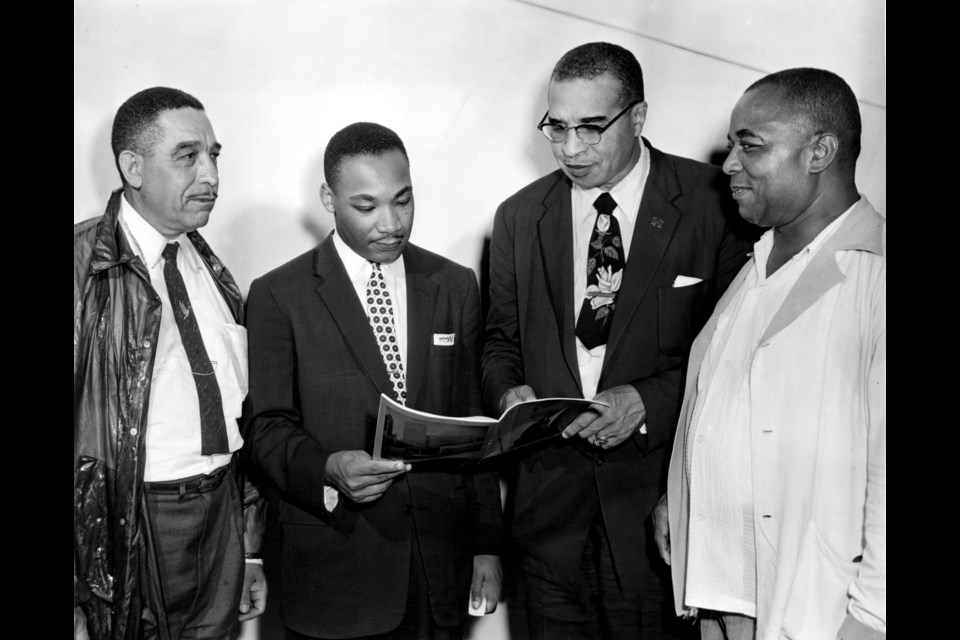DETAILS
Mr. Emancipation: The Walter Perry Story
Directed by Preston William Chase
60 minutes
Screening co-hosted by librarian Geoff Manderscheid and by Coun. Ray Watkins, joined by Preston Chase
7 p.m. on Fri., Feb. 19
Attendance is free for the Zoom event. Please visit sapl.libcal.com/event/3596800 to register for this event.
The last screening in the series to be held starting at 7 p.m. on Feb. 26. Visit sapl.ca to learn more.
"The largest Juneteenth celebration was not in America. It was in Windsor, Canada," civil rights activist Dick Gregory once said, referring to a festival unlike any other seen in this country, or in his.
Juneteenth, frequently known as Emancipation Day in the United States, commemorates the end of slavery in that country. The name comes from a portmanteau combination of 'June' and 'nineteenth' because it was on June 19, 1865 when Union Army Maj. Gen. Gordon Granger rode into Galveston, Texas to tell slaves of their emancipation more than two years after President Abraham Lincoln issued the Emancipation Proclamation. News apparently didn't travel that fast for some reasons back then.
Nowadays, Juneteenth is not a national holiday, but 46 states and the District of Columbia recognize it as a state holiday. Walter L. Perry of Windsor worked hard for decades to make sure that his city partied as hard as it could for the cause, though on August 1, not on June 19. After all, that's the day that commemorates the abolition of slavery throughout the British Empire in 1834, a full 21 years before Lincoln had anything to say about it.
Windsor's Emancipation Day celebrations were certainly more than enough reason to draw attention across the border and bring in some of our big name American cousins to the party too.
In its three-decade-long history, this festival was big enough to attract Eleanor Roosevelt, President Harry Truman, Joe Louis, Jesse Owens, Jack Johnson, and Dr. Martin Luther King, Jr., not to mention thousands of fun-loving citizens of all colours from this side of the border and south of it.
At one point, St. Albert city councillor Ray Watkins was a child and a face in the crowd at one of the Emancipation Day festivals. He said he remembers the party in the streets, and the celebration in the air.
"It reminded me of a small Rose Bowl parade: marching bands and clowns. They don't have parades like that anymore: lots of marching bands, lots of majorettes, and baton twirlers, and all sorts of stuff like that,” Coun. Watkins recalled. "It was really a celebration of emancipation of Blacks from slavery."
"I grew up as a kid with the Emancipation celebrations. All my family – my uncles and my aunts, most of them – were involved civil rights and human rights."
Perhaps that's the big reason why he's co-hosting a virtual screening of Mr. Emancipation: The Walter Perry Story as part of the St. Albert Public Library's Black Film Watch Parties next Friday. Along with co-host library assistant Geoff Manderscheid, he'll be joined by Preston Chase, the director of the film and Walter Perry's great-nephew.
Windsor might be a hop across the river from its closest American neighbour of Detroit, it is still firmly on Canadian land. Still, emancipation was celebrated in a huge way, though the annual event has now concluded.
"His success was his undoing," Watkins suggested, though the annual festivities still continue in August, COVID-19 notwithstanding. "It was an incredible achievement."
Chase's film does more than celebrate his great uncle and laud Windsor for making freedom a citywide celebration at least once a year. It also asks the big question: why don't more cities do the same?
Watkins noted that Windsor was a key pathway for the Underground Railroad, making it integral to the discussion, but even Edmonton suffered from having the Ku Klux Klan's presence from the 1930s with one charter remaining active even in 1980.
Watkins revealed he has a personal connection to Preston Chase, which only further confirmed his reasons for agreeing to co-host next Friday's event.
"My parents were his godparents. My father was basically a father figure to him. My father told him the story ... about Walter Perry and the story about how he started Emancipation and that motivated Preston to want to tell the whole story."
Watkins' mother makes an appearance in the film talking about the racism she experienced when she was a young woman of around 20 years who had to go the U.S to try to find a job. She couldn't get a job in this country because she was Black, Watkins said.
Systemic racism has roots that run deep, but his history as a fifth-generation Canadian run deeper than many people's roots. That in itself is enough to warrant the interest of everyone who cares about the history of this country, or its future.
"I think it's interesting. Canadians think, 'Oh, you know, we're squeaky clean. We have no racism; we have none of this bad history of slavery.' Well, yes, you did, until it was abolished. When the Black man came here, he wasn't welcomed with open arms. There was legislation passed in Alberta to try to stop Black people from coming."




